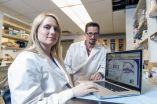(Press-News.org) Scientists have for the first time come closer to understanding how a clone of E. coli, described as the most important of its kind to cause human infections, has spread across the world in a very short time.
E. coli clone ST131 is one of the leading causes of urinary tract and blood stream infections and has crossed the globe at a rapid rate. Worryingly, members of this clone are becoming more resistant to antibiotics. As an indication of scale, more than half of all women will suffer a urinary tract infection at least once in their lives. An international team of scientists, led by the University of Queensland in Australia and with the UK work led by Plymouth University and the Cardiff University has studied ST131 and now has a better understanding of how it operates.
Their findings, published today in the prestigious Proceedings of the National Academy of Sciences (PNAS) USA, have two significant potential outcomes: the first and in the short term, enhanced screening of patients with either urinary tract or blood stream infection, so that those with ST131 receive appropriate treatment and management (ensuring that our most potent antibiotics are only used to treat severe infections caused by these resistant bacteria); and in the long term, the potential for the development of vaccines and other ways to control infection specific to this clone.
No one knows where or when ST131 came into being, but it is one of the most successful of its kind in terms of spread and invasiveness. It has become effective at causing infections and resisting antibiotics because it continually exchanges bits of DNA with other bacteria, a clever process which also gives it specific ways of hiding from the body's immune system.
The research team used genome sequencing to analyse strains of ST131 from six distinct geographical locations across the world spanning 2000 to 2011. Their work shows that, despite such a large geographical spread, the ST131 clone of E. coli came from a single ancestor, prior to the year 2000.
By isolating ST131's progression in this way, and understanding how it has been able to thrive, work can begin on the development of effective screening and vaccination strategies.
Dr. Mathew Upton, who led the study from Plymouth University, said: "The Chief Medical Officer has stated that antibiotic resistance is one of the leading threats to human health. We need to ensure that patients are treated, but we also need to be certain that we use the most appropriate antibiotic for the job. In a condition such as urinary tract infection, most patients will receive a 'best guess' diagnosis and treatment from their GP. While most will react favourably to the antibiotics they are given, others will not and in this case a possible culprit is E. coli ST131."
He added: "What we need to avoid is doctors using the few antibiotics that are effective against resistant ST131 for all cases of urinary tract infection, because it is seen to be the only therapeutic strategy that works. The outcome of this will be that all the other bacteria that contribute to urinary tract infection become resistant too, which in turn reduces the number of effective antibiotics available for treatment, especially for those patients who are really sick. Instead, we need to create effective screening processes for patients, to ensure that only those who are infected by ST131, and other drug resistant, virulent clones receive those 'reserve' antibiotics. Our global survey of ST131 E. coli is helping us to understand these bacteria in great detail and will support development of these urgently needed screening strategies.
"In time we can also use our findings to develop vaccines that are specific to ST131, but this solution is some years away."
Dr Tim Walsh from Cardiff University's School of Medicine added: "The paper describes the global distribution of an E. coli clone called ST131. This clone is recognised as a human pathogen and has collected additional DNA making it highly resistant and difficult to treat. The spread of these clones is due to economic globalisation through international food exports and human travel."
INFORMATION: END
Scientists understand how E. coli clone has become globally distributed
2014-03-31
ELSE PRESS RELEASES FROM THIS DATE:
Researchers announce first phononic crystal that can be altered in real time
2014-03-31
Using an acoustic metadevice that can influence the acoustic space and can control any of the ways in which waves travel, engineers have demonstrated, for the first time, that it is possible to dynamically alter the geometry of a three-dimensional colloidal crystal in real time.
The colloidal crystals designed in the study, called metamaterials, are artificially structured materials that extend the properties of existing naturally occurring materials and compounds. The research by academics from the University of Bristol's Department of Mechanical Engineering is published ...
Weaker gut instinct makes teens open to risky behavior
2014-03-31
DURHAM, N.C. -- Making a snap decision usually means following your initial reaction -- going with your gut. That intuitive feeling sprouts from the limbic system, the evolutionarily older and simpler part of the brain that affects emotion, behavior and motivation.
But during adolescence, the limbic system connects and communicates with the rest of the brain differently than it does during adulthood, leaving many adolescents vulnerable to riskier behaviors, according to Duke University researchers.
"We know adolescence is a time of profound social change. It's also ...
New tool helps young adults with sickle cell disease in the transition to adult care
2014-03-31
(Boston) – Child and adolescent hematologists at Boston Medical Center (BMC) have developed a tool to gauge how ready young adults with sickle cell disease are for a transition into adult care. In a new article for the Journal of Pediatric Hematology/Oncology, Amy Sobota, MD, MPH, and her collaborators have shown that a questionnaire geared to the needs of young adults with sickle cell disease can pinpoint areas of need before the patient goes into an adult clinic.
BMC's sickle cell disease transition clinic, which is unique in Boston, was established in 2008 and serves ...
Vibration may help heal chronic wounds
2014-03-31
Wounds may heal more quickly if exposed to low-intensity vibration, report researchers at the University of Illinois at Chicago.
The finding, in mice, may hold promise for the 18 million Americans who have type 2 diabetes, and especially the quarter of them who will eventually suffer from foot ulcers. Their wounds tend to heal slowly and can become chronic or worsen rapidly.
Timothy Koh, UIC professor of kinesiology and nutrition in the UIC College of Applied Health Sciences, was intrigued by studies at Stony Brook University in New York that used very low-intensity ...
Kinder, gentler med school: Students less depressed, learn more
2014-03-31
ST. LOUIS -- Removing pressure from medical school while teaching students skills to manage stress and bounce back from adversity improves their mental health and boosts their academic achievement, Saint Louis University research finds.
Stuart Slavin, M.D., M.Ed., associate dean for curriculum at SLU School of Medicine, is the lead author of the paper, which is published the April edition of Academic Medicine. The problem of depression among medical school students is significant, Slavin said, affecting between 20 and 30 percent of medical students in the U.S., and potentially ...
Poor sleep quality linked to cognitive decline in older men
2014-03-31
DARIEN, IL – A new study of older men found a link between poor sleep quality and the development of cognitive decline over three to four years.
Results show that higher levels of fragmented sleep and lower sleep efficiency were associated with a 40 to 50 percent increase in the odds of clinically significant decline in executive function, which was similar in magnitude to the effect of a five-year increase in age. In contrast, sleep duration was not related to subsequent cognitive decline.
"It was the quality of sleep that predicted future cognitive decline in this ...
Psychological factors turn young adults away from HIV intervention counseling
2014-03-31
PHILADELPHIA (March 31, 2014) – Keeping young people in human immunodeficiency virus (HIV) prevention programs is a major goal in reducing the incidence of HIV, and multi-session interventions are often more effective than single-sessions. But according to a new study from the Annenberg School for Communication, the way these programs are designed and implemented may turn off the very people they are trying to help.
The study, "Motivational barriers to retention of at-risk young adults in HIV-prevention interventions: perceived pressure and efficacy," is published in ...
Research shows link between states' personalities and their politics
2014-03-31
One state's citizens are collectively more agreeable and another's are more conscientious. Could that influence how each state is governed?
A recently published study suggests it could.
Jeffery Mondak and Damarys Canache, political science professors at the University of Illinois, analyzed personality data from more than 600,000 Americans, identified by state, who had responded to an online survey for another research study. They then matched that data with state-level measures of political culture, as identified by other, unrelated research.
The results were striking. ...
Warming climate may spread drying to a third of earth, says study
2014-03-31
Increasing heat is expected to extend dry conditions to far more farmland and cities by the end of the century than changes in rainfall alone, says a new study. Much of the concern about future drought under global warming has focused on rainfall projections, but higher evaporation rates may also play an important role as warmer temperatures wring more moisture from the soil, even in some places where rainfall is forecasted to increase, say the researchers.
The study is one of the first to use the latest climate simulations to model the effects of both changing rainfall ...
Black police officers good for entertainment only -- at least that's what movies tell us
2014-03-31
The presence of African-American police officers has been shown to increase the perceived legitimacy of police departments; however, their depiction in film may play a role in delegitimizing African-American officers in real life, both in the eyes of the general public and the African-American community.
In their recently released study, Sam Houston State University associate professor of criminal justice Howard Henderson and Indiana State University assistant professor of criminology and criminal justice Franklin T. Wilson found that African-American city police officers ...


